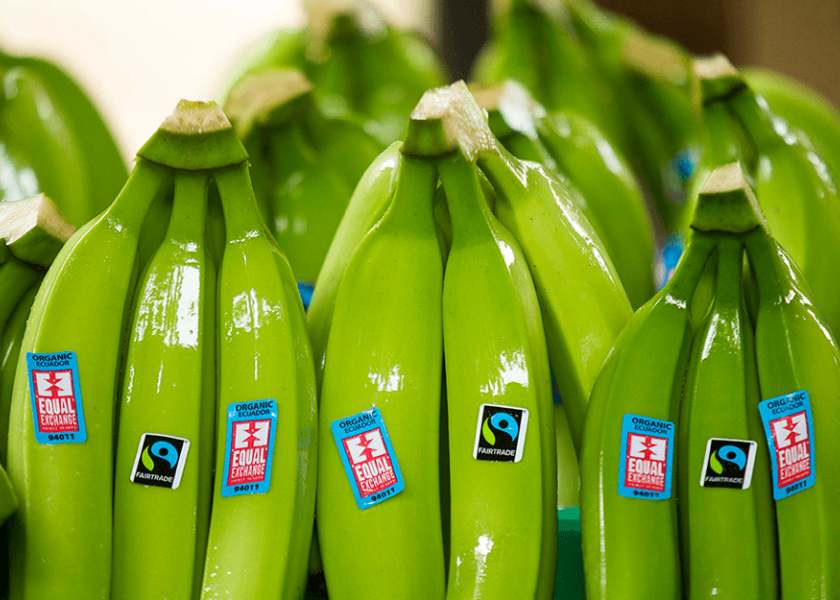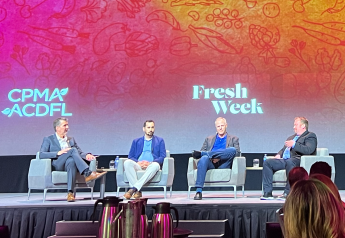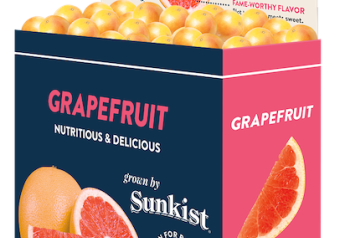Fairtrade America's 2023 trends include regenerative agriculture

Fairtrade America, which has a food-packaging label certifying that social justice and sustainability standards have been met, released its five key trends that will drive consumer choices and brand action in 2023.
Despite inflation and rising prices on groceries, research shows that many consumers are still making thoughtful choices while shopping, choosing products that align with their values, according to a news release.
Fairtrade America asserts that these shoppers are becoming increasingly interested in and informed about supply chains, sourcing and product sustainability. And that means fresh produce brands will need to invest in practices that drive loyalty among discerning consumers.
“Responsible shoppers in the U.S. are demanding that companies and governments drive transformation that benefits the people who grow our food and protects the planet,” Fairtrade America Director of Commercial Partnerships Carlos Urmeneta said in the release. “As expectations of transparency and sustainability in the supply chain become more and more mainstream, we are partnering with farmers, retailers and brands to provide shoppers the assurance they are looking for in their favorite products.”
A nonprofit 501(c)3 organization, Fairtrade America works to rebalance trade, making it a system rooted in partnership and mutual respect rather than exploitation. It’s about businesses, shoppers, farmers and workers all partnering so everyone can experience the benefits of trade. Fairtrade America is the U.S. branch of Fairtrade International, which has more than 30 years of experience working for fair trading practices in more than 30 countries.
Expect to see this type of consumer behavior in 2023, Fairtrade America says:
-
Consumers will change their diets to lower environmental impact.
About 31% of U.S. consumers who have changed their diet did it because of an environmental reason, with 11% saying they changed their diet specifically due to climate change, according to a GlobeScan study on behalf of the Marine Stewardship Council. As people seek to lower their environmental impact with everyday decisions such as what foods they eat, certifications from organizations like Fairtrade America, MSC and Non-GMO Project will provide visual guidance.
Shoppers are increasingly understanding that certifications like Fairtrade include environmental requirements as well as social and economic ones. About 77% of Fairtrade shoppers say the Fairtrade label makes it easy to decide if a product is ethically and responsibly produced, according to the release. Fairtrade sets environmental standards that aim to minimize producers’ impact on the planet, including banning the use of dangerous pesticides and genetically modified organism seeds, protecting natural resources and encouraging eco-friendly cultivation. Fairtrade also incentivizes organic farming through an increased minimum price paid to producer organizations.
-
Consumers, governments and organizations like Fairtrade are prioritizing a decrease in deforestation.
Since 2000, about 10% of the world’s tree cover has been lost, with the world losing an area the size of London each week, according to the release, which cited the United Nations. About 86% of consumers try to avoid products that damage biodiversity, according to a recent GlobeScan study for the Marine Stewardship Council. Consumers are increasingly aware of deforestation, and more companies are pushing for bans on deforestation and for governments to enact legislation that would combat deforestation.
Fairtrade standards stipulate that producers may not cut down protected forests, but many farmers go above and beyond this, using their Fairtrade premium funds to plant more trees, which can provide helpful shade and weather protection for their crops and expand forested areas.
-
Supply chain due diligence requirements will become more prevalent.
Across industries, 88% of companies have either created a clear mission statement around sustainability or are in the process of writing one, according to Oxford Economics, the release said. But less than half of those respondents said they had significant visibility into their own sourcing of sustainable products, and only 21% had complete visibility into their suppliers' sourcing of sustainable products. Also, Deloitte found that consumer brands that aren’t open and transparent are the most at risk of losing meaningful trust with consumers, according to the release.
More retailers are seeking brands that can provide transparency along the supply chain, including in the form of third-party certifications, according to the release. A wave of regulations on human rights and environmental due diligence has also begun in Europe in recent years. The European Commission adopted a proposal aimed at fostering sustainable and responsible corporate behavior throughout global value chains, and Germany passed the German Supply Chain Due Diligence Act in 2021 that will take effect on Jan. 1, 2023, according to the release. The U.S. is likely to follow — the Securities and Exchange Commission already announced proposed rules and rule amendments on corporate due diligence.
-
Growth in products marketed as sustainable.
The 2021 Sustainable Market Share Index found that sustainability-marketed products were responsible for a third of growth in consumer packaged goods from 2015 to 2021, and market share growth continues year over year, according to the release. Products marketed as sustainable now hold a 17% market share, up 3.3 percentage points from 2015, with significant growth during the pandemic. Also, products marketed as sustainable grew 2.7 times faster than products not marketed as sustainable.
As consumers continue to seek out sustainable options, companies aim to meet that demand by backing up sustainability claims. In 2021, more than 2,500 companies used the Fairtrade mark on more than 37,000 products sold globally, with Fairtrade products accessible to consumers in 143 countries, according to the 2022 Fairtrade Annual Report. In 2021, about 5,000 products from more than 500 brands were sold in the U.S. and made with Fairtrade-certified ingredients, specifically, and produced in accordance with the Fairtrade standards.
-
Consumers and brands will prioritize regenerative agriculture practices.
Regenerative agriculture is a description for farming practices that mimic nature’s design and help decrease impacts of climate change by working to replenish natural resources. Regenerative agriculture is focused on improving soil health and biodiversity. In a Food Insight survey, 30% of consumer respondents selected regenerative agriculture as a top choice among the most beneficial agricultural and consumption practices for the land their food is grown on, though only 19% of respondents were familiar with the term, according to the release. Fairtrade predicts an expanded focus on regenerative agriculture in 2023 as more brands work with farmers to implement these practices where ingredients are grown.
A key component of regenerative agriculture is diversification of crops and plants grown on farms. Using the Fairtrade premium, farmers are able to diversify the crops they grow on their land, which can benefit the land as well as provide additional sources of income and food security during off-seasons for their main crop.







